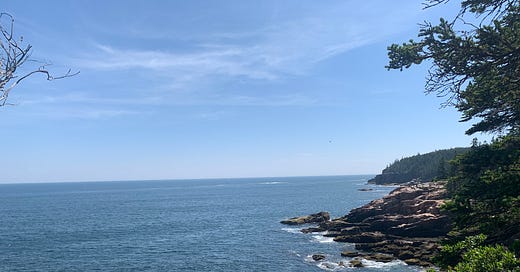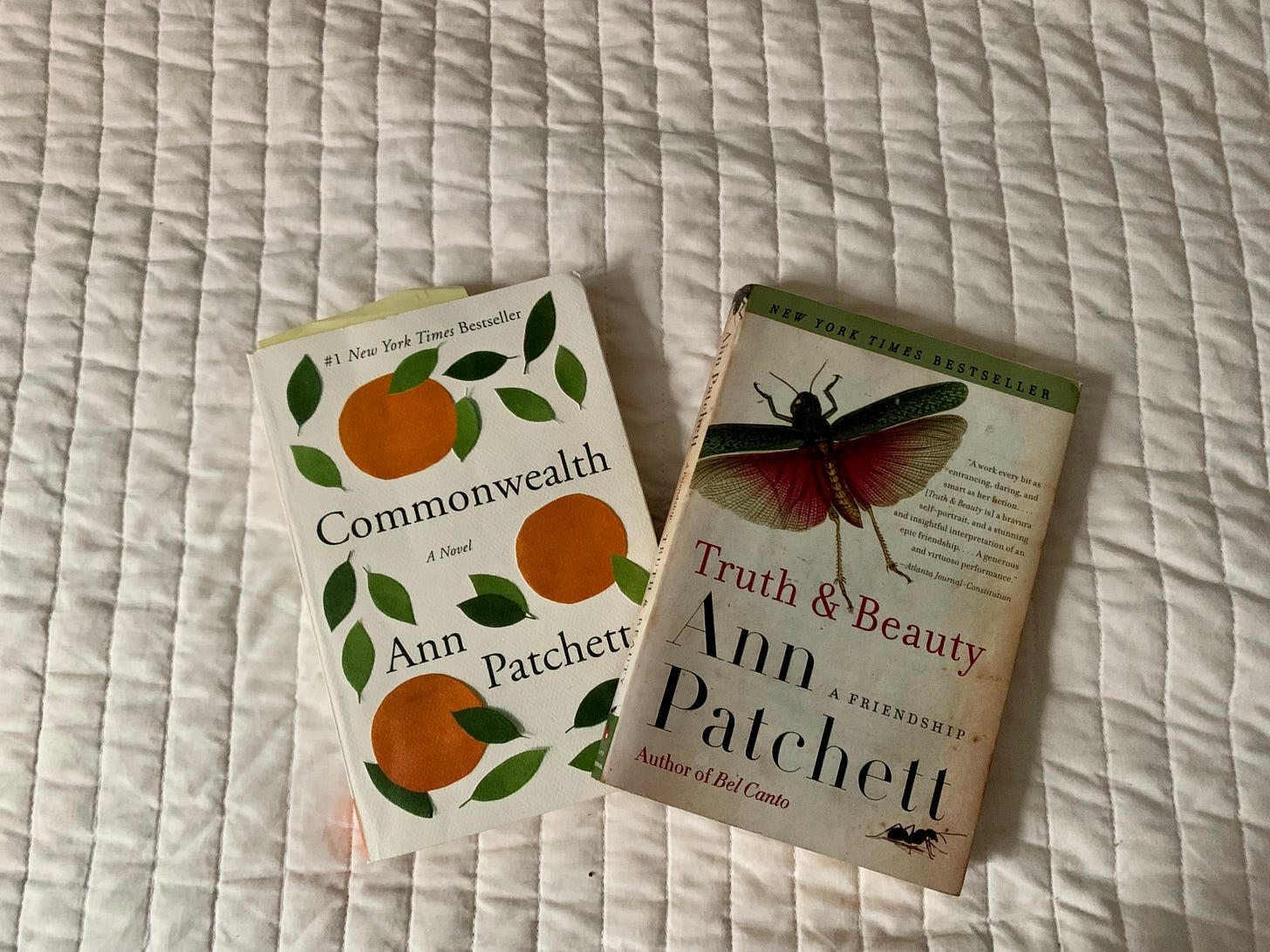Hi everyone,
I began my last newsletter by complaining about summer so it feels right to kick off this issue by mentioning some recent highlights: I had a blast at Barbie, got in my feels at a Maggie Rogers concert, reveled in seeing Patti Smith at Madison Square Garden, and spent some quality time with my family when they visited for my birthday last month. On Friday, I’m heading to Michigan for a week — not home, on the east side of the state, but to the west side with some friends to spend the last of summer on a lake.
At the beginning of the month, I drove to Maine to hike around Acadia (pictured above) and eat *a lot* of lobster. Funny story: I originally booked the rental car for Thursday-Sunday and it cost $710 (!). Then my partner and I decided to stay an extra day and drive back Monday. When I changed the rental car reservation it actually ended up being $300 cheaper (we’re still coming out ahead, even with an extra night at an inn). So you heard it here first: make your vacation longer and you’ll save money.
In this week’s issue:
1. What makes up my ‘rich’ life?
2. In my Ann Patchett era
3. Links
What makes up my ‘rich’ life?
I’m skeptical of most money personalities, but one I generally like/admire is Ramit Sethi, who’s best known for his book, “I Will Teach You to Be Rich,” and more recently his Netflix show, “How to Get Rich.” One of the things I like most about Sethi’s brand of personal finance is that it seems more realistic/empathetic than people who are like, “you can only spend this much on rent and if you spend anything else or EVER get into debt you deserve to be poor forever.” Sethi acknowledges that different people have different priorities — my budget won’t resemble yours, and it shouldn’t, because we’re different people with different backgrounds, income, interests, expenses, and so on. I recently interviewed Sethi for Fortune, you can read the articles here and here.
One of Sethi’s big things is having people define their own “rich” lives. This basically means determining what is most important to you—whether that be traveling, eating out, fitness, etc.—so that you make sure that how you’re spending your money lines up appropriately.
In theory, this concept shouldn’t be particularly revelatory. We all know what’s most important to us, right? But ever since I talked to Sethi last month, I’ve been a bit haunted by the question. Because it’s actually a much bigger question than it first appears.
“When I ask people, ‘what is your rich life?’ Ninety percent say, ‘I want to do what I want when I want,’” he told me. “‘Ok, what do you want?’ And they just stop stunned. Most of us have never thought about what we want to do.”
I haven’t been able to stop thinking about this since we spoke and I do not have an answer, which is scary to me. I don’t really know what kind of job I want to have for the rest of my career (the concept of a “career” seems increasingly anachronistic to me, but that’s a newsletter for another day). I don’t know where I want to live, or if I want to have kids (I’m 31 and feel an all-consuming pressure to figure that out stat). I don’t really have an idea of what amount of money would make me happy, and I’m also not sure how to figure that out.
I’m curious if others have thought through their rich lives, and if so, what have you come up with? How did you figure out what it is you want?
In my Ann Patchett era
After a few targeted TikToks, I decided to read The Dutch House by Ann Patchett (borrowed from the library on my e-reader, of course). Patchett is a fairly famous author, and I even follow her on TikTok, but I’ve only read her book of essays, and none of her fiction, for which she’s best known. I didn’t read any synopses of the book, so I wasn’t quite sure what I was in for, but I’m so, so glad I picked it up; it’s been a minute since I read something that made me feel so much for the characters, and wistful for a life that I haven’t lived. I was swept up in the story, laughing, cringing, and crying along the way.
In short, the book is told from the perspective of Danny, a man who lives in New York City but grew up in a small town outside of Philadelphia in a grand house built by a once-wealthy Dutch couple (thus the name). Really, though, the story is about Danny’s family and particularly his sister Maeve, their mother and father, and the people who came in and out of the Dutch house. It tells almost the full story of Danny’s (and Maeve’s) life, from living in the Dutch House to losing it, to growing up and getting married and having kids, and what happened to his family along the way. Patchett’s prose is straight forward, but there is something about it that made me feel so nostalgic — for childhood, for my parents then, for the people I used to know growing up, for college and all of that.
I decided pretty quickly after I started The Dutch House that I wanted to read through Patchett’s entire oeuvre. While in Maine, we stopped in a small used book store and I picked up Commonwealth and Truth & Beauty. I have a hold out for Bel Canto, which won a bunch of literary prizes. And by some beautiful coincidence, her newest book, Tom Lake, is set on a lake…in Michigan. So it feels only right that I read that while on my own Michigan lake trip next weekend.
It’s been a few years since I’ve felt so moved by an author that I immediately wanted to read everything they’ve written; I had forgotten what a good feeling that is.
Links
I’m loving the new Real Housewives of New York—like every other millennial interested in fashion, I find Jenna Lyons fascinating and it’s cool to get a peek into her life. But all of the women just feel really New York to me. Obsessed with this look inside Brynn Whitfield’s apartment.
The stats in this story about the wealth in California are…something. All I could think about while reading was the story I linked in the last newsletter about the homelessness crisis. The disparities are so stark.
Jealous of this story on the cost/logistics of returning stuff. So many interesting tidbits.
I’ve been digging the podcast The Town, hosted by Matt Belloni, and found this episode on what it really means for a movie to “flop” to be super interesting. Box office numbers are only a small part of the equation! (Does one day running an operation like Belloni’s Puck News count as my dream rich life?)
This has been the summer from climate hell all across Earth: “One environmentalist told me that ‘unprecedented’ has been used so often that it has lost any meaning against the uniqueness and horror of what is happening.”
That’s it for now. Have a great week,
A
P.S. If you know someone who would like this newsletter, please forward it along!
P.S.S. Thanks Christopher Skinner for the illustrations!






Same age and same lack of clarity about my "rich life." However, it's been great food for thought in my current break from work. I'm trying to pay attention to how I naturally spend my time and where my thoughts go now that they aren't tied to any strict work schedule.
Also! Ann Patchett is truly wonderful. I started out with Bel Canto many years ago and have only recently rediscovered her work (Commonwealth, Run, her book of essays). Bel Canto remains my fave so far, though.
My partner and I thought a lot about what we wanted our lives to look like, and that helped us make a big move 5 years ago. One strategy that was helpful for me was to think about what I wanted to be able to do every day or every week, rather than waiting for a special occasion, and then what I was ok not having/doing very often. Thinking about it in those terms helped me get clearer on how I wanted to spend my time—and what choices would help me work towards that reality.